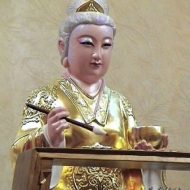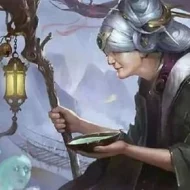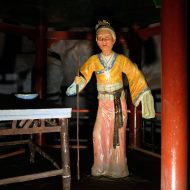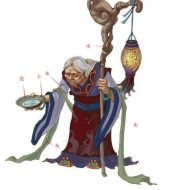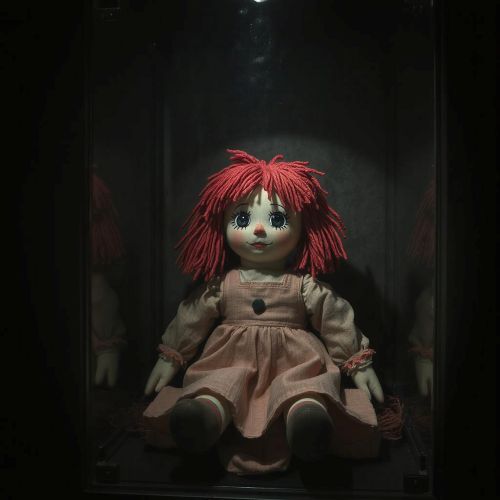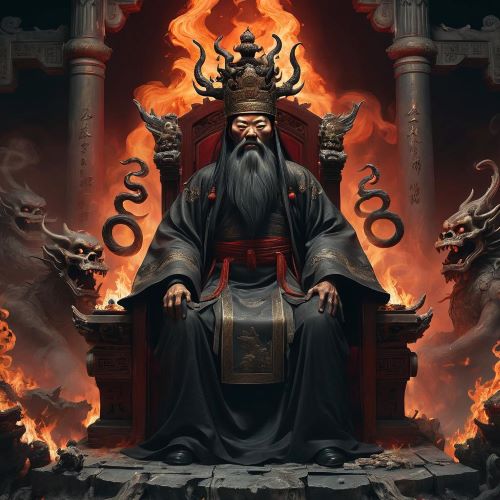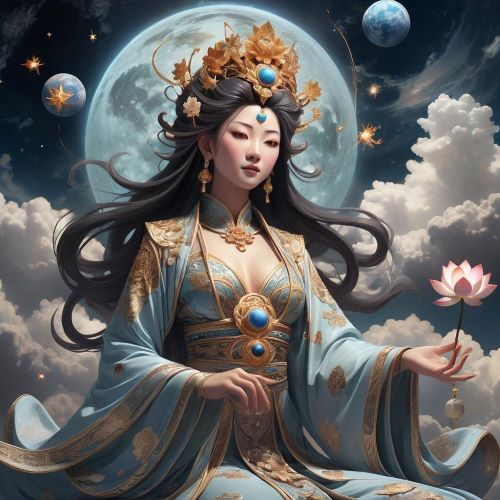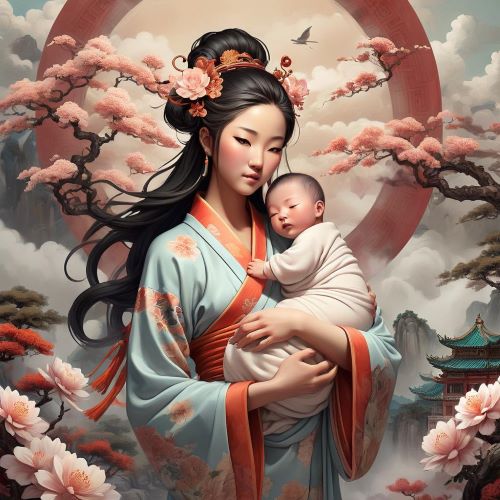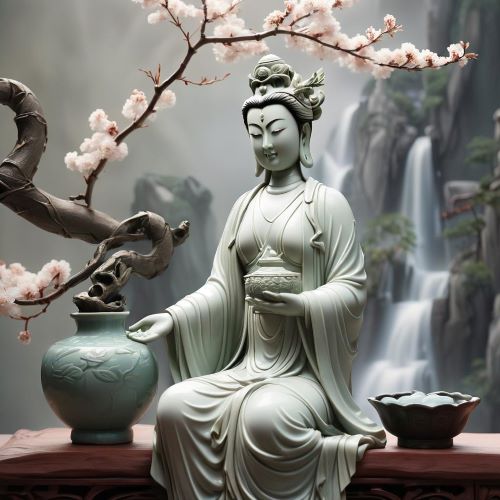Meng Po : Goddess of Forgetfulness
Listen
At a glance
| Description | |
|---|---|
| Origin | Chinese Mythology |
| Classification | Gods |
| Family Members | Di Zhang (Brother) |
| Region | China |
| Associated With | Forgetfulness, Death |
Meng Po
Introduction
Meng Po, often addressed as ‘Old Lady Meng,’ holds a significant role in Chinese mythology as the goddess of oblivion. She is recognized for her duty on the Bridge of Oblivion, also known as the Naihe Bridge. Here, she serves a unique soup with the power to wipe away the memories of individuals, allowing them to transition into their next life unburdened by the experiences of their past. Within the mysterious realms of the Diyu, the Chinese underworld, where mist swirls and whispers echo, Meng Po stands as a familiar yet enigmatic figure—the Goddess of Forgetfulness. Her presence, offering a bittersweet contrast to the harsh realities of Diyu, extends a final act of mercy to souls before they embark on the cycle of reincarnation.
Physical Traits
While the traditional texts do not explicitly outline specific physical features for Meng Po, she is commonly envisioned as an elderly woman, a characterization that resonates with her moniker, ‘Old Lady Meng.’ In artistic representations, she is often shown in the act of serving her transformative soup, symbolizing her pivotal role in the perpetual cycle of reincarnation. Despite embodying ageless wisdom, Meng Po is frequently portrayed as an elderly figure, her countenance bearing the marks of countless stories etched upon her kind yet weathered face.
The visual portrayal of Meng Po often includes distinctive details such as long, grey hair adorned with jade-green flowers, symbolizing themes of rebirth and new beginnings. Wrapped in simple earthen robes, she seamlessly blends into the otherworldly landscape of Diyu, the Chinese underworld. While some depictions present her as austere and imposing, an alternative artistic narrative paints Meng Po with a compassionate twinkle in her eyes and a gentle smile that, despite carrying the weight of eons, extends solace to the weary.
Dressed in traditional Chinese attire, Meng Po is commonly illustrated carrying a basket laden with the leaves of the “River of Forgetfulness.” This basket serves as a crucial element in her role as the custodian of souls, emphasizing her responsibility in guiding spirits through the intricate realms of the afterlife. The serene composure that defines her countenance belies the gravity of the duty she undertakes, illustrating her commitment to assisting souls in their journey beyond mortal existence.
Family
Although Chinese mythology does not explicitly mention Meng Po’s family, certain variations of the myth identify her as Lady Meng Jiang. In these renditions, Meng Jiang faces the challenge of reincarnation after the death of her husband, a poignant circumstance attributed to her overwhelming grief. While some versions depict Meng Po as a solitary figure, others introduce her within a celestial family dynamic.
In certain tales, Meng Po is portrayed as the sister of Di Zhang, the King of Earthly Deities, who holds the authority to bestow new destinies upon souls. This familial connection suggests a collaborative role in overseeing the intricate process of the cycle of life, death, and rebirth. Alternately, some accounts link Meng Po to Nuwa, the mythical earth goddess and creator of humanity. This connection implies a shared responsibility between the two goddesses in managing the cosmic order and the perpetual flow of existence. The absence of explicit family details in the mythology leaves room for diverse interpretations, adding layers of complexity to Meng Po’s enigmatic character.
Other names
Meng Po is recognized under various alternative names, encompassing Lady-Meng, Meng-P’o, Meng-Po-Niang, Meng-Po-Niang-Niang, Mi-Hung-Tang, and Mong-Po. While her most common designation is Meng Po, signifying “Old Lady Meng,” the rich tapestry of Chinese mythology bestows upon her a diverse array of monikers, each shedding light on different facets of her significant role.
Referred to as “The Mistress of the Naihe Bridge,” these names acknowledge her pivotal position on the Bridge of Forgetfulness, the gateway guiding souls toward reincarnation. “The Weaver of Oblivion” draws attention to her mastery in crafting the powerful Meng Po Soup, a concoction with the ability to erase memories of past lives. Through these alternative names, Meng Po’s multifaceted nature is encapsulated, showcasing the nuanced layers of her mythology and the diverse attributes associated with her profound role.
Powers and Abilities
Meng Po wields a distinctive ability that holds a pivotal role in the cyclical narrative of life, death, and reincarnation within Chinese mythology. At the heart of her influence lies the concoction known as the Five Flavored Soup of Oblivion. Crafted from an assortment of earthly herbs, this soup induces immediate and enduring amnesia upon those who partake in it. Consequently, the memories of past lives fade away, paving the way for the spirit to embrace a new earthly existence without the baggage of knowledge or the sins accrued in previous lifetimes.
The crux of Meng Po’s extraordinary power resides in her expertise in the art of forgetting. Her hallmark creation, the Meng Po Soup, is a brew meticulously crafted from potent herbs and tears of the damned. This concoction serves as an eraser of all remnants of a soul’s preceding life. Despite its bitter nature, there is a strange comfort in this powerful elixir, granting souls the opportunity to approach their impending incarnation with a pristine slate, unencumbered by the weight of past experiences.
Beyond her role as the purveyor of forgetfulness, Meng Po possesses the unique ability to communicate with departed spirits. This communion allows her to glean wisdom and insight from the narratives of these souls, enriching her understanding of the complexities of existence. While commonly associated with the concept of oblivion, Meng Po’s power can be reframed as a liberating force, presenting souls with the chance for unburdened new beginnings as they embark on the perpetual journey of reincarnation.
Modern Day Influence
Meng Po’s influence transcends the boundaries of ancient mythology, making a significant impact on contemporary culture. The character gained widespread recognition in 2018 through the romantic film “The Ferry Man Manjusaka.” Moreover, her unique abilities have found a place in the realm of video games, as seen in the 2022 release “Dislyte,” where the character Jiang Man is bestowed with the powers associated with Meng Po. This seamless integration of her character into diverse forms of entertainment reflects the enduring fascination with her mythological significance.
The celestial sphere also bears witness to Meng Po’s influence, as evidenced by the naming of celestial bodies. Meng-p’o Macula, an equatorial dark region on Pluto, stands as a testament to her impact on astronomy. Her motif extends its reach into various artistic expressions, including literature, art, and video games. Often serving as a symbol of acceptance, new beginnings, and the bittersweet beauty of letting go, Meng Po’s presence in modern media prompts contemplation on profound themes.
Her story, embedded in art, literature, and the virtual realm, triggers thought-provoking questions about memory, identity, and the perpetual cycle of life and death. In a contemporary world burdened by the weight of the past, Meng Po’s offer of forgetfulness possesses a peculiar allure. It beckons individuals to reflect on the baggage they carry and the potential for rejuvenation that lies in the act of letting go. In this way, Meng Po’s influence continues to resonate, inviting contemplation and exploration of the timeless themes encapsulated in her mythical narrative.
Related Images
Frequently Asked Questions
What is lorem Ipsum?
I am text block. Click edit button to change this text. Lorem ipsum dolor sit amet, consectetur adipiscing elit. Ut elit tellus, luctus nec ullamcorper mattis, pulvinar dapibus leo.
What is lorem Ipsum?
I am text block. Click edit button to change this text. Lorem ipsum dolor sit amet, consectetur adipiscing elit. Ut elit tellus, luctus nec ullamcorper mattis, pulvinar dapibus leo.
What is lorem Ipsum?
I am text block. Click edit button to change this text. Lorem ipsum dolor sit amet, consectetur adipiscing elit. Ut elit tellus, luctus nec ullamcorper mattis, pulvinar dapibus leo.
What is lorem Ipsum?
I am text block. Click edit button to change this text. Lorem ipsum dolor sit amet, consectetur adipiscing elit. Ut elit tellus, luctus nec ullamcorper mattis, pulvinar dapibus leo.
What is lorem Ipsum?
I am text block. Click edit button to change this text. Lorem ipsum dolor sit amet, consectetur adipiscing elit. Ut elit tellus, luctus nec ullamcorper mattis, pulvinar dapibus leo.

